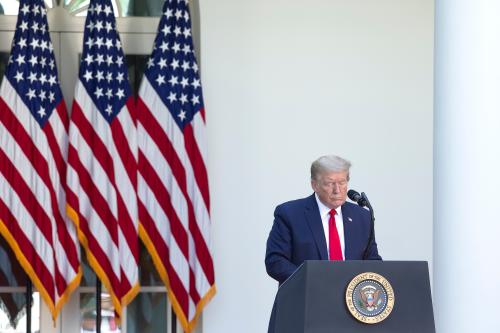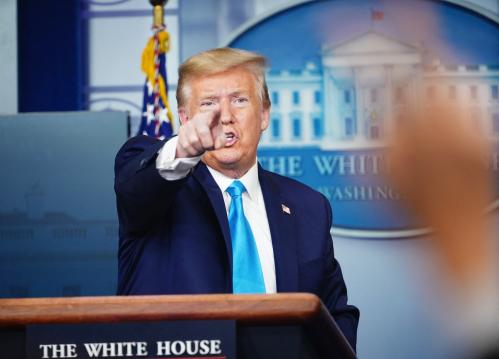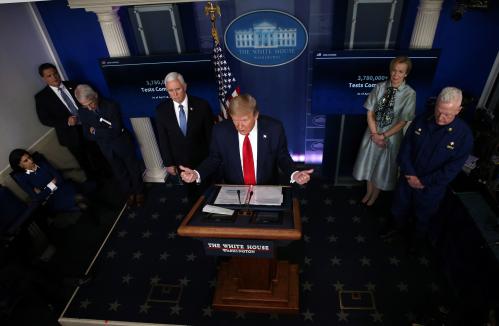For the past three years the Republican Party leadership have stood by the president through thick and thin. Previous harsh critics and opponents in the race for the Republican nomination like Senator Lindsey Graham and Senator Ted Cruz fell in line, declining to say anything negative about the president even while, at times, taking action in the Senate to limit presidential prerogatives in foreign policy. And after the House voted to impeach the president on a party-line vote, the Republican Senate voted to acquit him, losing only one Republican Senator.
But the president’s handling of the coronavirus pandemic may have brought about the first faint cracks in the Republican wall of support for Trump.
For instance, Republican governors are not moving in lock step with President Trump’s desires to reopen the country quickly. The two Republican Governors of Democratic states, Governor Charlie Baker (MA) and Governor Larry Hogan (MD) have been openly critical of many of Trump’s moves. But other Republican Governors have been following their own judgment and mostly giving lip service to Trump. As of today, among the states with Republican governors, nine have reopened (although three of them never fully shut down), ten have reopened with restrictions and eight are still mostly closed down.
In the Congress there are signs that, as Trump’s re-election prospects dim, members of Congress are worried—especially in the Senate where Democrats need to pick up only a few seats to end Mitch McConnell’s reign as majority leader. At the end of April, a 57-page leaked memo from the National Republican Senatorial Committee advised Senate candidates, when asked about coronavirus: “Don’t defend Trump, other than the China Travel Ban — attack China.”. The Trump campaign moved quickly to attack the memo and the authors backed off. Nonetheless, the Senate’s most vulnerable Senators are walking a thin line between staying loyal to Trump and criticizing him. For instance, Senator Susan Collins told Politico: “His initial step to ban travel to China was appropriate and yet he got criticized for it. It turned out to be correct….On the other hand, when he veers into giving medical advice or promoting various treatments, he creates problems and should stay out of that.”
In the House of Representatives, prospects for a Republican takeover were never very good and now some Republicans fear their numbers could get worse. The few moderate Republicans that survived the 2018 Democratic victories are worried about their re-election prospects and trying to emphasize their bipartisan credentials. One former member of Congress, Carlos Curbelo, who lost his Florida seat in 2018, said what other moderate Republicans couldn’t say; he told The New York Times, “The president continues to be reckless in the context of the Covid-19 crisis… You could see a similar dynamic where a lot of Republicans in competitive districts will just break with him in an effort to protect their own candidacies.”
This week a group of Republicans calling themselves “The Lincoln Project” went public with their first ads against Trump. There were no surprises in the group’s membership; it is composed of Republican operatives tied to staunch opponents of Trump such as former Governor John Kasich of Ohio and both former presidents Bush. Perhaps the most interesting of them is George Conway, a lawyer and husband of Kelly Anne Conway, a senior aide to President Trump and one of his most ferocious defenders. For months Conway has been trying to warn America that Trump is mentally unfit for office, first in a lengthy piece in the Atlantic and most recently in a brutally critical op-ed in the Washington Post.
Several of the ads by this group of “never Trumpers,” as they were called back in 2016, are designed to take on vulnerable Republican senators who have defended Trump.[1]
But the ad receiving the most attention was a play on one of the most famous and effective political ads ever, “Morning in America.” “Morning in America” was made for President Ronald Reagan’s re-election campaign in 1984, it is a low-key classic filled with beautiful pictures of Americans going to work, buying homes, and getting married. The voiceover recalls all the good things that happened in Reagan’s first term—things that left America “prouder, stronger, better.” The Lincoln Project’s new ad is called “Mourning in America.” Its style is a dystopian version of the Reagan ad. It blames Trump for acting too slowly on the coronavirus as it shows pictures of people out of work and in hospitals. In a conscious parallel with the first ad it claims that America is “weaker, sicker, poorer.” Trump devoted a series of tweets to denigrating the ad and the group, proof that it got under his skin.
There are signs of the president’s weakening political standing among voters as well, as my colleague Bill Galston writes. If his prospects don’t improve, we are likely to see more cracks in what was once a solid and united Republican Party.
[1] The Lincoln Project. Their targets are: Susan Collins (ME), Cory Gardner (CO) Martha McSally (AZ) and Thom Tillis (NC).
This work is licensed under the Creative Commons Attribution-NonCommerical-NoDerivatives 4.0 International License. To view a copy of the license, visit https://creativecommons.org/licenses/by-nc-nd/4.0/.







Commentary
In the Republican Party establishment, Trump finds tepid support
May 8, 2020